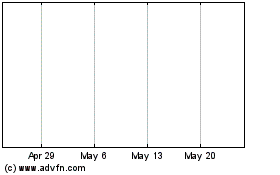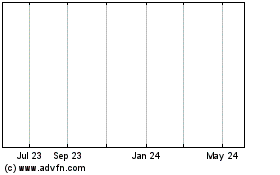2nd UPDATE: US Regulators Take Next Step On Nonbank Oversight
October 11 2011 - 5:05PM
Dow Jones News
U.S. regulators Tuesday moved closer to mandating heightened
oversight and tougher capital standards for more financial
institutions, the latest step toward determining which companies
pose the greatest risk to the financial system.
The Financial Stability Oversight Council, in a voice vote,
proposed a new rule that would step up supervision for some nonbank
financial companies.
The council would set a series of thresholds to determine if a
company is a so-called systemically important financial
institution: firms that have at least $50 billion in assets, and
also cross one additional financial boundary, would come in for
further evaluation.
In addition to the minimum asset requirement, companies trigger
the second round of scrutiny if they have $30 billion in
outstanding credit default swaps, $3.5 billion in derivative
liabilities, $20 billion in outstanding loans borrowed and bonds
issues, a 15 to 1 leverage ratio measured as assets to equity, or a
10% ratio of short-term debt to total assets.
The council in the first and second rounds measures nonbank
financial companies using publicly available information. Nonbanks
include hedge funds and private-equity firms, insurance companies,
specialty lenders and broker-dealers.
If regulators are worried that a company--because of its
portfolio, size and exposure to the rest of the system--would hurt
the broader economy during a period of distress, the third stage of
review begins.
Companies entering the third phase would be notified and receive
yet more analysis using additional information provided by the
firm.
At the end of stage three, the council with a two-thirds vote
can designate an individual firm as systemically significant.
Companies can contest the determination, which would spur a hearing
and a second vote.
"This is important because we had a financial crisis caused by
many things, but it was caused in part by the fact that we allowed
a large amount of risk to build up in our financial system outside
the scope of the classic set of safeguards that ... we impose on
banks for example," Treasury Secretary Timothy Geithner said.
Geithner is council chairman.
The Dodd-Frank financial-overhaul law, written in the aftermath
of the 2008 financial crisis, automatically designates banks with
$50 billion or more in assets as systemically important. But it
gives regulators authority to decide which nonbank financial
companies pose risks.
The rules are designed to avoid a repeat of Lehman Bros.
collapse and American International Group Inc.'s (AIG) 2008
meltdown. The federal government bailed out AIG with $69.8
billion.
This is the council's second take on the rule for nonbanks.
Industry groups said the first effort was too vague and created too
much uncertainty. They are still studying the 68-page proposal.
"It's been pretty hard to get our arms around what FSOC is
looking at. At least now the picture is forming a little more,"
said Tom Quaadman, vice president of the US Chamber's Center for
Capital Markets.
FSOC is looking for public comment on the latest proposal. A
final rule and designation of individual companies is likely months
away.
Many companies are wary of the new rules, which could impose
higher costs. The American Insurance Association, for example, has
asked regulators to consider its industry "unique and fundamentally
different than banking and other financial services."
The Federal Reserve will regulate the firms deemed systemically
significant.
-By Jeffrey Sparshott, Dow Jones Newswires; 202-862-9291;
jeffrey.sparshott@dowjones.com
Lehman (NYSE:LEH)
Historical Stock Chart
From Jun 2024 to Jul 2024

Lehman (NYSE:LEH)
Historical Stock Chart
From Jul 2023 to Jul 2024
